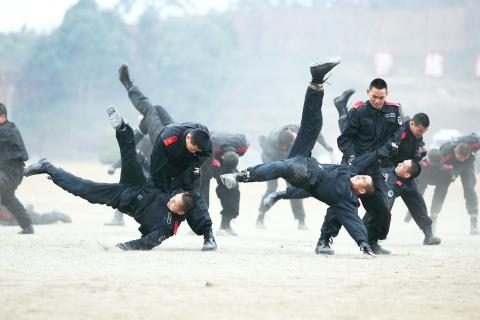A prominent exiled Uighur leader has urged China’s government to respond calmly to a knife attack in the country’s southwest and not “demonize” ethnic Uighurs after Beijing blamed the mass killings on extremists from the far western region of Xinjiang.
World Uyghur Congress president Rebiya Kadeer added that tension could only be reduced in Xinjiang if China acknowledged rights issues faced by the large Uighur minority.
China has vowed to crack down on what it says are militants bent on transforming Xinjiang into an independent state called East Turkestan. However, it has also emphasized ethnic unity after what it called a terrorist attack on Saturday in Kunming in which 33 died, including four assailants.

Photo: Reuters
Many Muslim Uighurs object to Chinese curbs on their culture and religion, though authorities say they enjoy broad freedoms.
“At this time of heightened tensions, it is important for China to deal with the incident rationally and not set about demonizing the Uyghur people as state enemies,” Kadeer said in the English-language statement, using the group’s spelling for the Uighur minority.
“The fact remains that peaceful dissent against repressive government policies targeting Uyghurs is legitimate, so the Chinese government must not conflate this constructive criticism with the events of 1 March,” she said.
“It is absolutely vital the Chinese government deal with the longstanding and deteriorating human rights issues facing Uyghurs if tensions are to be reduced,” she said.
Kadeer is a former Chinese political prisoner accused of leaking state secrets in 1999 who left China on medical parole and settled near Washington with her husband and part of her family in 2005.
She previously had been a celebrated millionaire who had advised China’s parliament, and is now condemned by Beijing as an “anti-Chinese splittist.”
Chinese Ministry of Foreign Affairs spokesman Qin Gang (秦剛) condemned both her group and her comments.
“The so-called World Uyghur Congress is an anti-China separatist group. They have no capacity to represent China’s Uighur people,” he told a daily news briefing.
“Her remarks make it obvious that she is seeking to take the serious violent terrorist incident in Kunming and link it to a certain ethnicity. This shows an ulterior political motive,” he said.
The group’s statement added that the World Uyghur Congress “unequivocally condemns the violence that took place at Kunming railway station” and expressed condolences to victims’ families.
The government has not explicitly accused Uighurs of carrying out the attack, though by calling them Xinjiang extremists the implication is clear.
The one person identified by Beijing as being an attacker, Abdurehim Kurban, appears to be Uighur, judging by his name.
Another of the suspected attackers, a woman, has regained consciousness in hospital and “confessed to [her]) crimes,” Yunnan’s provincial Communist Party boss Qin Guangrong (秦光榮) said, according to a Web site run by the state prosecutor’s office.
The Beijing government has responded with anger to suggestions its policies may be to blame for violence in Xinjiang, saying that it faces a real threat from “terrorists.”
Fu Ying (傅瑩), spokeswoman for China’s largely rubber-stamp parliament, which opens its annual session today, told reporters that the Kunming attackers were “inhuman” killers and that the world should unite to combat terrorism.

Former Nicaraguan president Violeta Chamorro, who brought peace to Nicaragua after years of war and was the first woman elected president in the Americas, died on Saturday at the age of 95, her family said. Chamorro, who ruled the poor Central American country from 1990 to 1997, “died in peace, surrounded by the affection and love of her children,” said a statement issued by her four children. As president, Chamorro ended a civil war that had raged for much of the 1980s as US-backed rebels known as the “Contras” fought the leftist Sandinista government. That conflict made Nicaragua one of

COMPETITION: The US and Russia make up about 90 percent of the world stockpile and are adding new versions, while China’s nuclear force is steadily rising, SIPRI said Most of the world’s nuclear-armed states continued to modernize their arsenals last year, setting the stage for a new nuclear arms race, the Stockholm International Peace Research Institute (SIPRI) said yesterday. Nuclear powers including the US and Russia — which account for about 90 percent of the world’s stockpile — had spent time last year “upgrading existing weapons and adding newer versions,” researchers said. Since the end of the Cold War, old warheads have generally been dismantled quicker than new ones have been deployed, resulting in a decrease in the overall number of warheads. However, SIPRI said that the trend was likely

NUCLEAR WARNING: Elites are carelessly fomenting fear and tensions between nuclear powers, perhaps because they have access to shelters, Tulsi Gabbard said After a trip to Hiroshima, US Director of National Intelligence Tulsi Gabbard on Tuesday warned that “warmongers” were pushing the world to the brink of nuclear war. Gabbard did not specify her concerns. Gabbard posted on social media a video of grisly footage from the world’s first nuclear attack and of her staring reflectively at the Hiroshima Peace Memorial. On Aug. 6, 1945, the US obliterated Hiroshima, killing 140,000 people in the explosion and by the end of the year from the uranium bomb’s effects. Three days later, a US plane dropped a plutonium bomb on Nagasaki, leaving abut 74,000 people dead by the

Indian Prime Minister Narendra Modi is to visit Canada next week, his first since relations plummeted after the assassination of a Canadian Sikh separatist in Vancouver, triggering diplomatic expulsions and hitting trade. Analysts hope it is a step toward repairing ties that soured in 2023, after then-Canadian prime minister Justin Trudeau pointed the finger at New Delhi’s involvement in murdering Hardeep Singh Nijjar, claims India furiously denied. An invitation extended by new Canadian Prime Minister Mark Carney to Modi to attend the G7 leaders summit in Canada offers a chance to “reset” relations, former Indian diplomat Harsh Vardhan Shringla said. “This is a